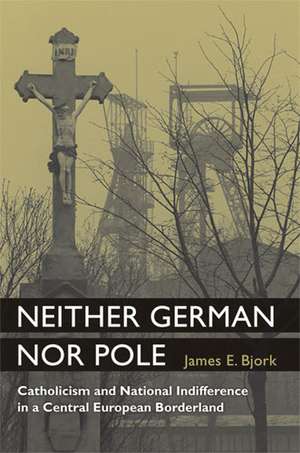Neither German nor Pole: Catholicism and National Indifference in a Central European Borderland
Autor James Bjorken Limba Engleză Hardback – 9 sep 2008
"This is a fascinating local story with major implications for studies of nationalism and regional identities throughout Europe more generally."
---Dennis Sweeney, University of Alberta
"James Bjork has produced a finely crafted, insightful, indeed, pathbreaking study of the interplay between religious and national identity in late nineteenth-century Central Europe."
---Anthony Steinhoff, University of Tennessee at Chattanooga
Neither German nor Pole examines how the inhabitants of one of Europe's most densely populated industrial districts managed to defy clear-cut national categorization, even in the heyday of nationalizing pressures at the turn of the twentieth century. As James E. Bjork argues, the "civic national" project of turning inhabitants of Upper Silesia into Germans and the "ethnic national" project of awakening them as Poles both enjoyed successes, but these often canceled one another out, exacerbating rather than eliminating doubts about people's national allegiances. In this deadlock, it was a different kind of identification---religion---that provided both the ideological framework and the social space for Upper Silesia to navigate between German and Polish orientations. A fine-grained, microhistorical study of how confessional politics and the daily rhythms of bilingual Roman Catholic religious practice subverted national identification, Neither German nor Pole moves beyond local history to address broad questions about the relationship between nationalism, religion, and modernity.
---Dennis Sweeney, University of Alberta
"James Bjork has produced a finely crafted, insightful, indeed, pathbreaking study of the interplay between religious and national identity in late nineteenth-century Central Europe."
---Anthony Steinhoff, University of Tennessee at Chattanooga
Neither German nor Pole examines how the inhabitants of one of Europe's most densely populated industrial districts managed to defy clear-cut national categorization, even in the heyday of nationalizing pressures at the turn of the twentieth century. As James E. Bjork argues, the "civic national" project of turning inhabitants of Upper Silesia into Germans and the "ethnic national" project of awakening them as Poles both enjoyed successes, but these often canceled one another out, exacerbating rather than eliminating doubts about people's national allegiances. In this deadlock, it was a different kind of identification---religion---that provided both the ideological framework and the social space for Upper Silesia to navigate between German and Polish orientations. A fine-grained, microhistorical study of how confessional politics and the daily rhythms of bilingual Roman Catholic religious practice subverted national identification, Neither German nor Pole moves beyond local history to address broad questions about the relationship between nationalism, religion, and modernity.
Preț: 561.05 lei
Preț vechi: 667.92 lei
-16% Nou
Puncte Express: 842
Preț estimativ în valută:
107.36€ • 116.98$ • 90.46£
107.36€ • 116.98$ • 90.46£
Carte indisponibilă temporar
Doresc să fiu notificat când acest titlu va fi disponibil:
Se trimite...
Preluare comenzi: 021 569.72.76
Specificații
ISBN-13: 9780472116461
ISBN-10: 0472116460
Pagini: 304
Ilustrații: 1 map, 3 tables
Dimensiuni: 152 x 229 x 36 mm
Greutate: 0.65 kg
Ediția:First Edition
Editura: UNIVERSITY OF MICHIGAN PRESS
Colecția University of Michigan Press
ISBN-10: 0472116460
Pagini: 304
Ilustrații: 1 map, 3 tables
Dimensiuni: 152 x 229 x 36 mm
Greutate: 0.65 kg
Ediția:First Edition
Editura: UNIVERSITY OF MICHIGAN PRESS
Colecția University of Michigan Press
Notă biografică
James E. Bjork is a lecturer in the History Department of King's College London.
Recenzii
"This valuable study fills a significant void in the English-languageliterature on Upper Silesia and deserves careful consideration from Polishand German scholars working in the field."
--Robert E. Alvis, Saint Meinrad School of Theology, American Historical Review
--Robert E. Alvis, Saint Meinrad School of Theology, American Historical Review
"Whether or not one agrees with all of Bjork's efforts to assign broader applicability to his findings, he has produced the only modern English-language account, based on wide reading and a thorough plumbing of provincial archives, of political developments in this key borderland - important not just because of its unique ethnic mix, of course, but also because it was imperial German's second most important (and post-1922 Poland's most important) industrial region. His study adds significantly to our understanding of the ethnic, political, and especially confessional dynamics of a particular stage in the evolution of the German-Polish relationship, and for that reason alone will be of interest to historians of Germany and Poland alike."
--Richard Blanke, Slavic Review
"James Bjork has written a landmark study, a stunningly original analysis of the crystallization of national identity out of the spirit of 'anationality' and 'national indifference' that will become standard reading for scholars of nationalism, ethnic borderlands, and the history of religion and its intersection with ethnicity....And he has written a work of enduring significance, which will shape the field for many years."
--Helmut Walser Smith, Journal of Modern History
--Helmut Walser Smith, Journal of Modern History
Winner: Association for Slavic, East European, and Eurasian Studies (ASEEES) 2010 Kulczycki Prize in Polish Studies
Descriere
A unique study of the importance of religious identification in a multi-national region
